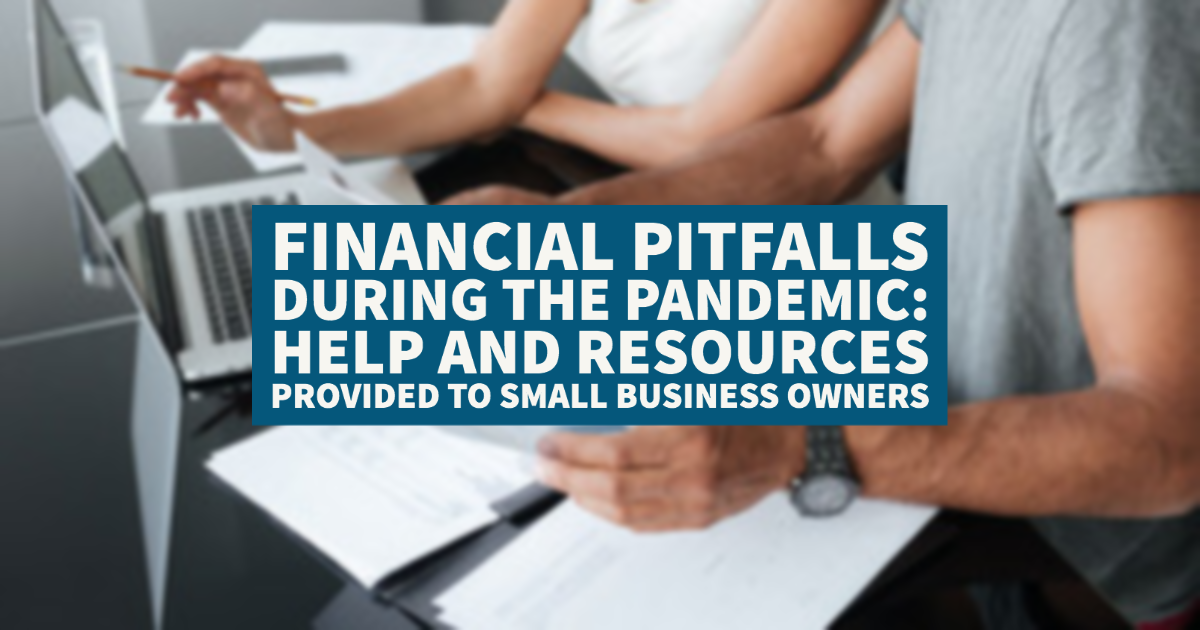
For many years, consumers have been more interested in supporting local small businesses over big-box stores. In fact, about 46% of Google searches are for either a local service or a local business. Unfortunately, COVID-19 has impacted all areas of life, and small business owners in particular have been hit hard. While relief has been minimal and businesses are still struggling, many states and communities are reaching out with financial help for small business owners, helping to get them back on their feet.
Small Businesses Need Financial Help and Resources

The full economic impact of the COVID-19 pandemic has yet to be seen, but everyone from Hispanic food distributors to hotels to your local ice cube distributor has already endured hardship. Financial help for small business owners is more needed than ever, and getting it has so far been difficult.
Between state-imposed shutdowns, ever-changing health protocols, and an uncertain future, small business owners are facing tough choices between trying to keep their doors open, or closing forever. Fortunately, small businesses all over the country have been getting help from their local governments and residents of their communities.
Small Business Resources in California

Financial help for small business owners helps them to keep employees on payroll and to keep their doors open amidst the pandemic. Due to surging cases, Southern California is under a stay-at-home order by state mandate, and this has left many small home remodeling businesses unable to provide services like a complimentary consultation and solar panel installation. Beyond the home remodeling industry, restaurants and non-essential retail stores are feeling the pain of this economic hardship. The need for financial help for small business owners has never been greater, and California is responding in a number of ways.
Carl Kemp, environmental health public affairs manager of the L.A. County Department of Public Health, is helping businesses ensure they comply with COVID safety protocols. Businesses in Los Angeles County can take advantage of a free online training course in COVID safety compliance. The training program is available in 13 languages, and upon completion, small businesses will receive a COVID-19 Safety Compliance Certificate that they can display in their business. Kemp says, “CSCCP is one page, sort of like a restaurant grade that your business is in compliance.”
The county has also launched a “Safer at Work LA” campaign to boost awareness of any public health orders and support essential workers. Launched by Sara Fisher, economic justice and community partnerships manager at L.A. County Aging and Community Service, says, “The campaign targets three sectors: employers, employees and customers to understand changing regulations. These bright, fun reminders of what people can do to keep L.A. safer.”
Supervisor Hilda Solis continued, saying “Our essential workers, by definition, are integral to the functioning of our healthcare system, food supply chain, government operations and much more. Keeping them safe is more important now than ever before. The ‘Safer at Work LA’ campaign is a critical reminder that worksites and businesses, as well as customers and employees, must collectively work together to slow the spread of COVID-19 in the workplace.”
Los Angeles county is also sharing information by operating a disaster helpline that provides assistance to business owners, landlords, and tenants. Open Monday through Friday, the help line offers answers and if they do not have an answer, they will connect the caller to the right agency.
As another resource, Bet Tzedek Legal Services is offering legal education, outreach, and direct legal services throughout the county. Alisa Shudofsky, director of Bet Tzedek Pro Bono Programs, says, “We’re conscious of the fact that marginalized communities have been impacted in a severe way. There has been a 40% drop in black-owned business, 30% drop in Latinx, female businesses. So we have stepped up our outreach to help business owners get on their feet. Renegotiating commercial leases, rent deferral payments, other lease issues. Contract enforceability, how to be a good employer, insurance issues, entity formation. Free legal webinars open to anyone. We also make direct legal services available. That’s an important part of our mandate.”
Small Business Resources in California: Part 2

With businesses from roofing companies to local eateries to retailers like bookstores feeling the devastation of the pandemic’s economic impact, Santa Clara County is offering a new low-interest loan program.
Proposed by county supervisors Joe Simitian and Susan Ellenberg, this financial help for small business owners offers loans of up to $100,000 for qualifying businesses, with three- or five-year term options and a 4.25% interest rate. In order to qualify for these loans, a business must have less than 50 full-time employees, at least a 25% reduction in revenues compared to a prior one-year period, and revenues of under $2.5 million in 2019.
Says Simitian, “These funds are available now and are relatively easy to apply for. I know people are hurting, and these funds are a step in the right direction.”
Financial help for small business owners in Santa Clara county is possible through a partnership with state entity California Rebuilding Fund and public sector resources to Community Development Financial Institutions. “We need all the state and federal help we can get, but by using these local dollars as well we can make sure local businesses and their employees make their way to the top of the list,” Simitian said.
CEO of the nonprofit Accion Opportunity Fund, Luz Urrutia, notes that the program will be especially helpful for minority and immigrant-owned businesses, who she says “have been left behind by federal relief efforts.”
Says Urrutia of financial help for small business owners, “Small businesses have been the driving force behind every economic recovery, including leading the way out of the Great Recession. They can do it again, but not without an intentional effort to reach and support them.”
Small Business Resources in Rhode Island

Financial help for small business owners in Rhode Island is now available thanks to the Rhode Island Small Business Development Center (RISBDC) and a program already successful in a number of states.
The Edward Lowe Foundation enables the CEO/President to work through common second-stage challenges, some of which include recruiting and retaining employees, creating internal infrastructure, and more.
Ed Huttenhower, Executive State Director of the RISBDC said, “One of the key areas for a business to succeed and grow coming out of the pandemic is to plan and examine key possible areas of growth. The Level Up program being offered by the RISBDC and the Edward Lowe Foundation will provide participating businesses the opportunity to do this through the various aspects of the program.”
Level Up is a virtual, integrated program offering a growth-oriented consulting engagement to help small businesses identify barriers and opportunities and provide strategic information through the help of a consulting engineer. A series of CEO round tables, leadership retreats, and more are tailored to the realities that second-stage businesses face.
Diane Fournaris, RISBDC Associate State Director, said, “Second-stage business owners face challenges and opportunities that differ from those confronted by start-up, early stage, and mature businesses. The Level Up program will help them to deal effectively with the challenges presented by growth and make the most of the opportunities to scale their businesses.”
In addition to financial help for small business owners, the RISBDC at the University of Rhode Island provides local small business owners with the expertise and services required to be successful. Funded in part through a Cooperative Agreement with the U.S. Small Business Administration, the RISBDC has successfully completed an extensive accreditation process in addition to the Small Business Administration.
In other states where a program similar to Level Up has been offered, an investment of $1 yields a return of $9 to the local economy. With the resources, information about general business law, and financial help for small business owners available, there is plenty of hope for Rhode Island business owners.
Credit Card Company Provides Incentive to Help Small Businesses

Many locally owned small businesses are desperate for help, and one credit card company is reaching out with offers and rehabilitation services. American Express has introduced new offers for cardholders with a consumer, small business, or co-brand card. The offers are aimed at helping the country navigate negative economic impacts as a result of the COVID-19 pandemic, and to help plan for the future.
Rachel Stocks, Executive Vice President, Global Premium Products and Benefits, American Express, says of the financial help for small business owners, “Last year we moved quickly to support our Card Members by delivering relevant value and services to help them navigate the uncertainties of the pandemic. As a result, we saw incredible engagement across these offers which drove increased loyalty and lower attrition levels than in 2019 across our Card Member base.”
She continued, “As we start a new year, we’re continuing to find ways to elevate our Membership experience by adding new value to help our Card Members and small merchants make the most of their time spent at home, plan for the future, and help small businesses get back to business.”
In 2020, many businesses invested money in technology and remote working capabilities. Projections for 2021 include technology as the main investment for small- and mid-sized businesses.
Courtney Kelso, Senior Vice President and General Manager, U.S. Commercial Card, Global Commercial Services, at American Express says, “As the business landscape evolves, we’re focused on designing offers and solutions that give small businesses the continued support they need to navigate these uncertain times and come out stronger. With just over 82% of our U.S. Small Business Card Members getting back to business, we want to reward them with offers that make sense for their business right now – such as shipping and advertising – while also setting them up for the future.”
With incentives like $25 back as statement credits for purchases over $500 up to 10 times through June 2021, American Express is helping to provide financial help for small business owners and rehabilitation centers so that they can get back to business and on the road to recovery.
How Can You Help Struggling Businesses?
Interested in how you can help small businesses in your area? Even though some businesses may not be open or open to full capacity as a result of the pandemic, you can still provide support. One way to infuse businesses with cash now is to purchase gift cards or gift certificates. While you may not be able to use your gift card immediately due to health restrictions, you will be able to use it at a future date while still giving them the infusion of cash they need now.
Looking for new dining room sets? Interested in paintless dent removal? Searching for the best local nail salon? Posting on social media about local businesses not only gives people the information they may not have had, but it also provides free advertising for the business. You can support your favorite local businesses by posting about them, sharing their social media pages, and leaving positive reviews that attract other potential customers.
Tired of cooking at home? Enjoy a favorite dish by a local restaurant by ordering food for pickup or delivery. Many local eateries are offering delivery services, and even more are taking orders for contactless pickup. This allows you to support the business, get a night off from cooking, and stay safe in your home. If restaurants in your area are open at a limited capacity and you feel comfortable going to dine there, spend a date night enjoying your favorite local spot. Whether you are going to eat-in, pick up food, or get something delivered, it’s important to remember to tip the person helping you. Not only are they helping you get your food, but they are also adhering to stringent guidelines to make sure your food arrives uncontaminated.
Federal, state, and local programs are offering a number of programs that provide financial help for small business owners, and you can help local businesses in your area remain open. Even if you have no cash to spare at the moment, promote local businesses and plan on visiting when you can.



